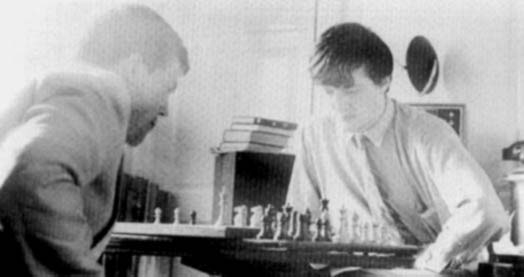
Edward Winter
A celebrity with a considerable interest in chess is the British writer, actor and presenter Stephen Fry. This photograph appeared in his autobiography Moab is My Washpot (London, 1997) and is reproduced here with his permission.

‘Playing chess with Hugh Laurie: my rooms at Cambridge, 1980’
(3972)
We are also authorized to quote extracts from two chess articles by Stephen Fry. The first, ‘Chess Piece’, was published on page 23 of The Listener, 24 November 1988:
‘The sight of a pasty-faced creature in bottle-end spectacles pushing little wooden men around a board hardly qualifies as throbbing pageant. Knowing the rules isn’t enough either. You can sit in a hall and try to follow a game of grandmaster chess and be certain that the only people in the world who have the faintest grasp of the position on the board are the two players playing. Ex-world champions and mighty pundits have all been known to watch a difficult game and announce, say, that Scratchkov is looking good and winning comfortably, only to be startled and humiliated by Scratchkov’s sudden resignation. There’s nothing hidden, the pieces are on view for all to see, but the intellectual complexity and the depth of analysis demand such concentration that a game can only really be understood even by the worthiest masters when it is published with annotations months after it has been played.’
‘The fact is that chess is completely pointless. As Raymond Chandler so rightly said, it is the greatest waste of human intelligence outside an advertising agency. So I would urge you all to make a daily check on the English position in this current Olympiad and celebrate with me the fact that as a nation we have found true world class in an activity that is joyously, arrogantly, unrepentantly useless, unproductive, unhealthy and wonderful. Only when we can take pleasure in things done entirely for their own sake will we discover how to succeed in more useful activities. That is what play is all about.’
The second article by Stephen Fry was entitled ‘Giving the Smyslov Screw a theatrical twist’ and appeared in the Daily Telegraph, 26 October 1990, page 21:
‘My own theory, and I cannot emphasize its worthlessness enough, is that chess is fundamentally a theatrical affair. I first became really interested in the game when I heard about the Smyslov Screw. There was a great Russian world champion, who recently enjoyed something of an Indian summer, called Vassily Smyslov, particularly noted as a master of the endgame. Whenever he moved a piece from one square on to another he had a habit of twisting it, as if screwing it into the surface of the board.
Others might drop their man lightly or bang it aggressively, Smyslov gently screwed it in. The psychological effect of such a move can be devastating. It looks so permanent, so deliberate, so absolutely assured. Kasparov hunches himself over the game, in a brooding, minatory and virile manner that is worth at least three extra pawns.’
After a discussion of historic parallels between the schools of drama and of chess (Classical-Romantic, Modern, Hypermodern, and post-Modern/post-Hypermodern) the article concluded:
‘If we wish to achieve real supremacy in chess we must stress those qualities that have given our drama its greatest strength: the eccentric, the bizarre, the comic, the mannered and the elegant; the same qualities we associate with, say, Stoppard or Olivier. We must at all times refrain from the conventional, the orthodox, the pedestrian and the timid. We need chess equivalents of Alastair Sim, Ralph Richardson, Maggie Smith, Noël Coward, Arthur Lowe and Alan Bennett: absolute mastery, benevolently disguised.Chess is indeed like life, for we need people of precisely those qualities in all aspects of our national existence. If we have a contribution to make to the world that might stave off grey-suited stalemate it is to offer a bouncy, charming, unorthodox and theatrical flair.’
(4275)
Regarding the ‘greatest waste of human intelligence’ remark, see C.N. 12177 in Raymond Chandler and Chess.
The Fry Chronicles by Stephen Fry (London, 2010) frequently mentions chess. For example, pages 182-183 relate a conversation with Alistair Cooke during a dinner at Trinity Hall, Cambridge in 1981. Cooke ...
‘... talked wonderfully of his time at Jesus College in the late twenties and early thirties. He spoke of Jacob Bronowski, who had the rooms above him. “He invited me to a game of chess and as we sat down asked me, ‘Do you play classical chess or hypermodern?’”’
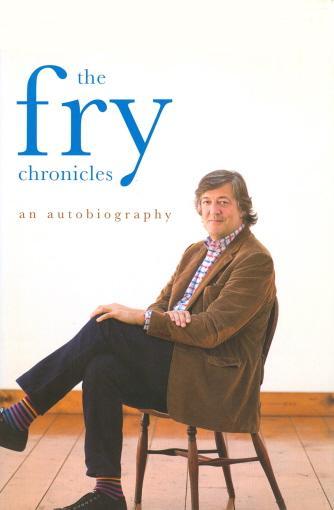
Most of the book’s references to chess concern one of Fry’s closest friends, Kim Harris. From page 81:
‘Aside from his proficiency at Latin and Greek Kim had another skill and at a level of brilliance that seemed to me to be quite superhuman. He was a chess Master. At Bolton he had played with, and to some extent mentored, Nigel Short, who was already becoming well known as the greatest prodigy England had ever produced. At the age of ten Short had beaten the great Viktor Korchnoi and now at 14 was on the verge of becoming the youngest International Master in history. Kim was “just” a Master, but that meant he was skilful enough to play blindfold, a trick I never tired of urging him to perform. Without any sight of the board he would demolish all comers.’
The term ‘Master’ is used loosely in connection with Kim Harris, but during the period in question his name appeared as a participant in Oxford v Cambridge Varsity matches. For instance, on page 243 of the June 1979 BCM Harry Golombek gave Harris’ loss to Simon Finn, who ‘produced a fine knight sacrifice that won convincingly and secured for him the prize for the best game played by Oxford’. Harris appeared in group photographs in the June 1980 BCM (page 310) and on page 162 of the May 1981 issue.
Which chess websites Stephen Fry may visit we do not know, but this general remark on page 95 may be noted:
‘... trollers on internet sites ... who specialize in posting barbarous, mean, abusive, look-at-me, listen-to-me anonymous comments on YouTube and BBC “Have Your Say” pages and other websites and blogs foolish enough to allow space for their poison. Such swine specialize in second-guessing the motives of those who are brave enough to commit to the risk of making fools of themselves in public and they are a blight on the face of the earth.’
(6839)
From Nigel Short (Athens):
‘Kim Harris played on board one for Bolton School in my first year there (1977). He also represented Lancashire on a number of occasions during that relatively brief period when he was an active player. While I do not recall his precise rating peak, his playing strength was over 190 BCF (roughly 2200 Elo), so Stephen Fry’s loose usage of the term “master” is perhaps not that inappropriate if one makes a comparison to the title of USCF Master.’
(6842)
Stephen Fry reviewed Kasparov’s Child of Change in The Listener, 5 November 1987, pages 27-28.
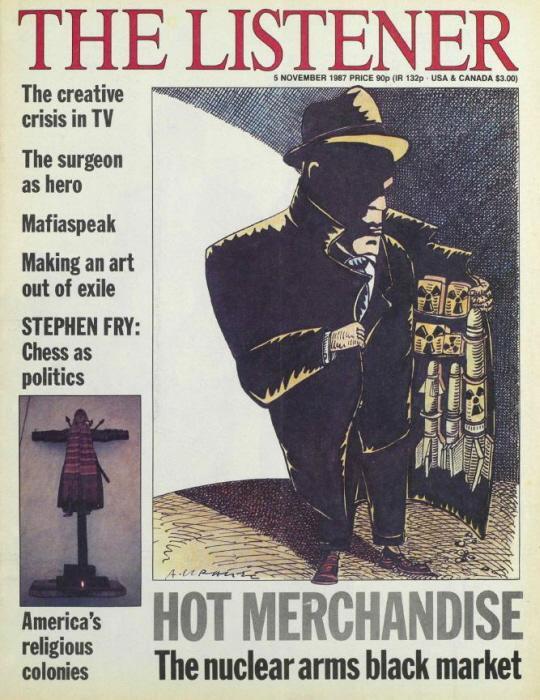
On page 11 of the 29 September 1988 issue Stephen Fry contributed an article entitled ‘The New Olympiad’ which concluded with a reference to chess. As noted on page 238 of Kings, Commoners and Knaves, a letter from him about chess was published on page 15 of issue 10 of Kingpin.
Stephen Fry and Alan Davies were on front cover of the Radio Times, 24-30 August 2013, in connection with the BBC television programme QI, and page 15 had a photograph of them with a chess theme:
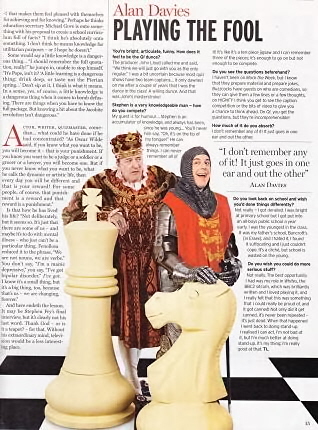
Addition on 10 September 2013:
We are very grateful to Stephen Fry for permission to reproduce here the complete texts of three articles referred to above:
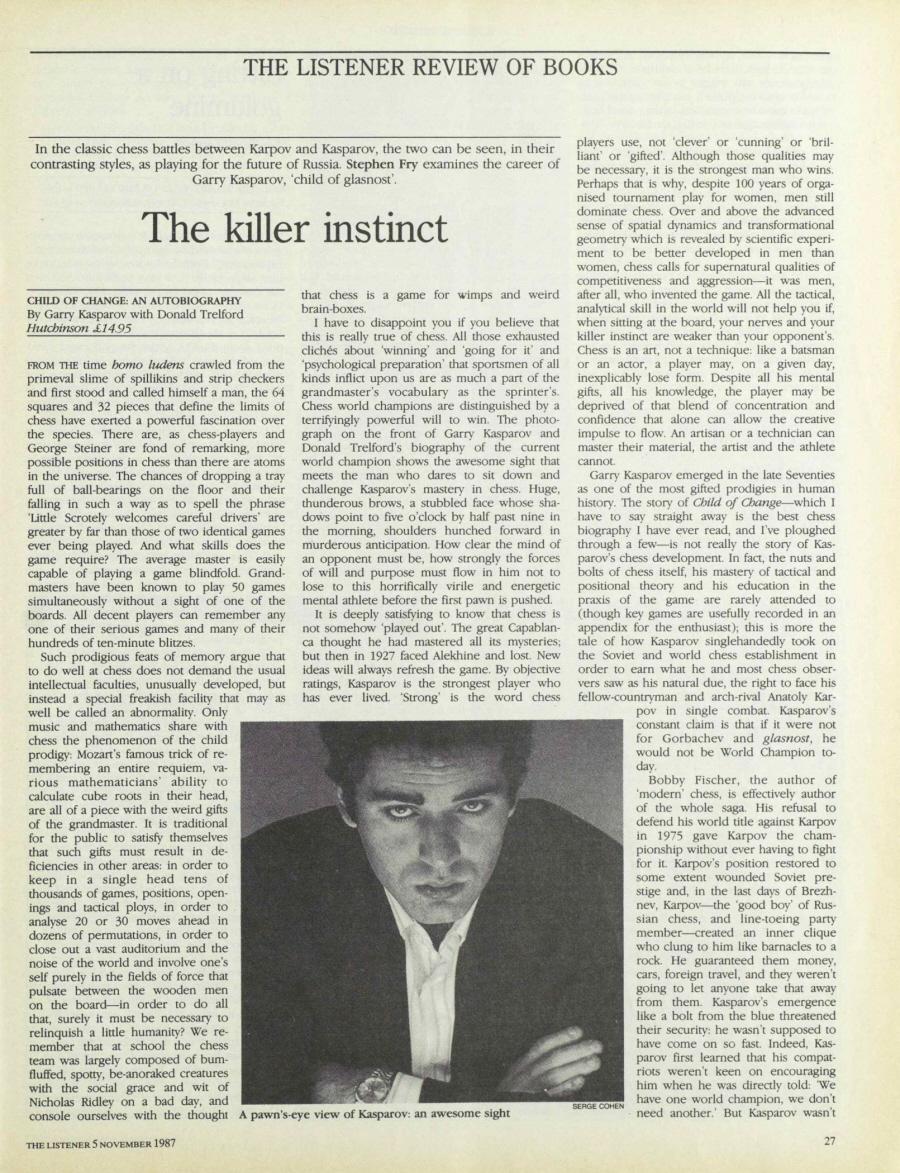
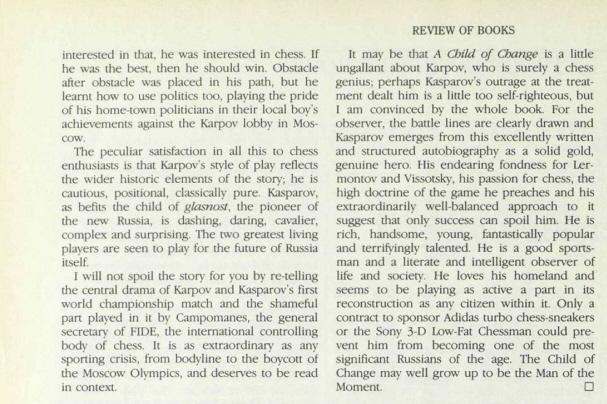
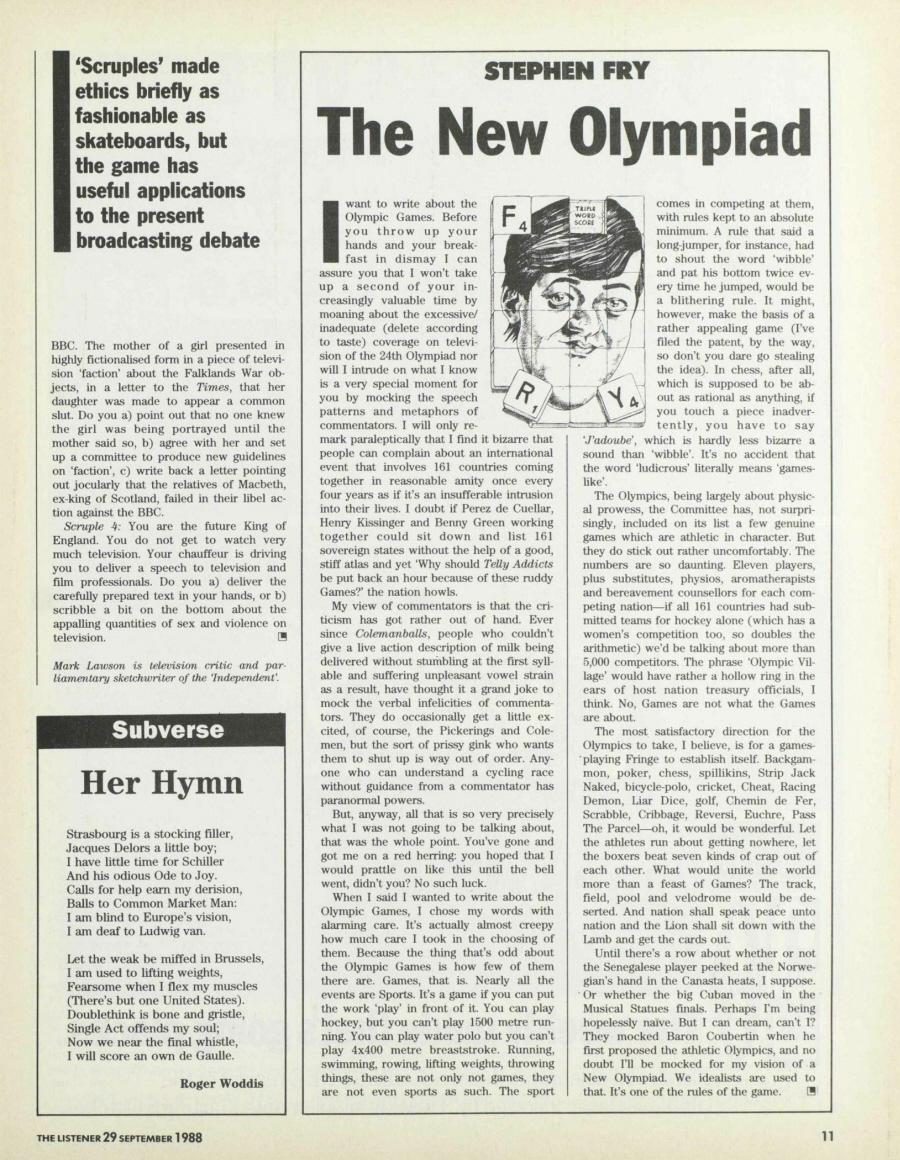
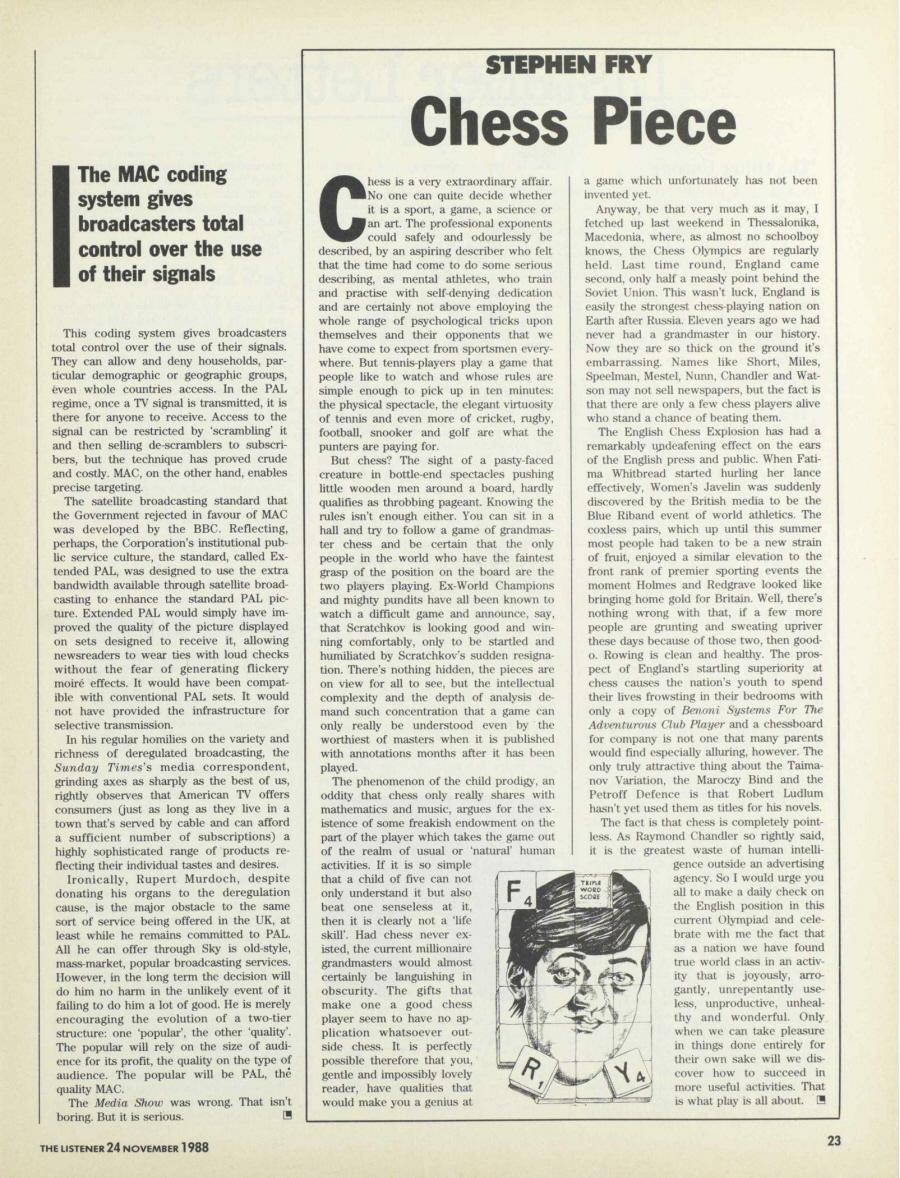
Addition on 11 May 2024:
On 11 December 1988 BBC-2 broadcast a documentary, Grandmaster Clash presented by Stephen Fry, about that year’s chess Olympiad in Thessaloniki. It has been highly praised by some.
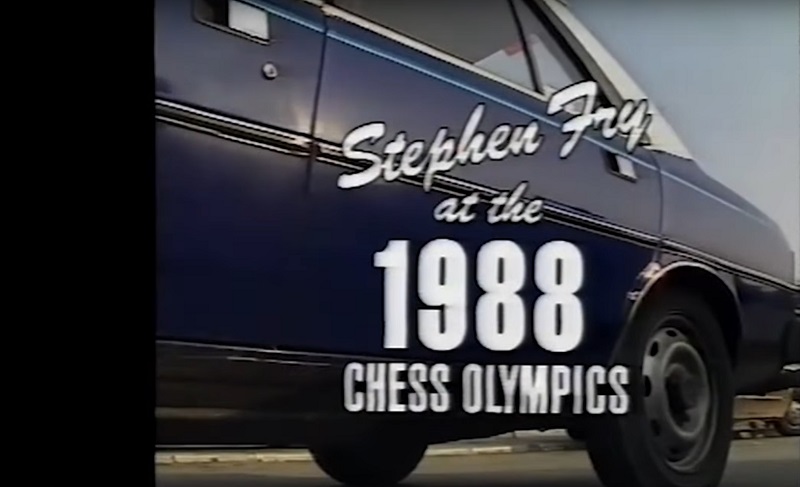
Are any game-scores available featuring Stephen Fry?
One game which he played in public was in a simultaneous exhibition by Matthew Sadler in London on 2 July 1988 against ‘celebrity opponents’ (BCM, August 1988, page 355). There was also a brief report, with a photograph, on page 27 of the September 1988 CHESS.
(8767)
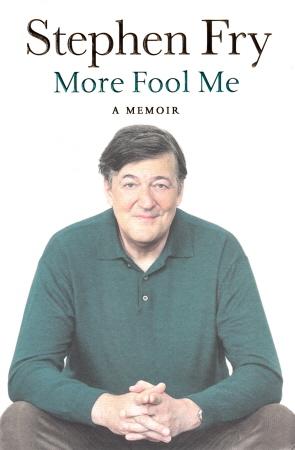
The latest book by Stephen Fry, More Fool Me (London, 2014), has many passages about chess in the chapter featuring his 1993 diary. They relate to that year’s Kasparov v Short match and begin on page 262.
(8864)
Below is an extract from page 115 of Making History by Stephen Fry (London, 1996):
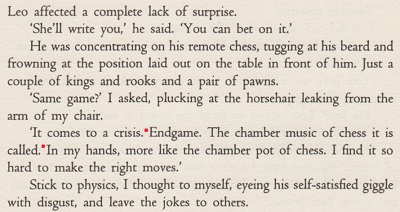
The passage is in a chapter, ‘Making Moves’, which has a chess theme (pages 112-117).
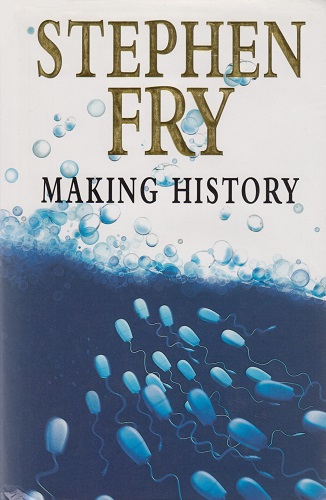
(9304)
The above item was posted in connection with the attribution to Tarrasch of the phrase ‘the chamber music of chess’ with regard to the Queen’s Gambit. See too C.N. 9313.
A comment of ours in Instant Fischer (‘Kasparov has trouble not contradicting himself over what he said last Tuesday’) was quoted by Olimpiu G. Urcan on Twitter on 23 February 2021, accompanied by a clip from the 1937 Laurel and Hardy film Way Out West in which, replying to ‘What did he die of?’, Stan Laurel said, ‘I think he died of a Tuesday ...’ A question of language arises: why, in such cases, is Tuesday the most effective day to mention?
We have put the matter to Stephen Fry, who replies:
‘No question that Tuesday is the funniest day. Always has been. Though Douglas Adams came up with that line “This must be Thursday. I never could get the hang of Thursdays” which shows Thursday comes in a good second. Monday wouldn’t work because there’s a reason why “I don’t like Mondays” as Bob Geldof sang. Wednesday is just too much of a mouthful to zing. Friday is too associated with payday and the end of the week, and the other two days are reserved for weekend properties. So perhaps it’s more a process of elimination … I wonder if any continental languages have equivalents. Is Mittwoch as funny as Dienstag?
Tuesday doesn’t follow the “hard C” rule (see the film The Sunshine Boys for a wonderful scene involving hard Cs).
Noël Coward often pondered why some place names are funny, and even claimed that in America funny place names are only funny because the word itself is inherently amusing “Schenectady” “Kalamazoo” “Albuquerque" – whereas the British find certain places funny for less obvious reasons: “Neasden" and “Purley” might elicit a laugh, whereas “Hendon” and “Portsmouth” for example wouldn’t. Hugh [Laurie] and I got much mileage out of Uttoxeter, mileage that Exeter or Huddersfield would never have offered …’
(11857)
To the Chess Notes main page.
To the Archives for other feature articles.
Copyright: Edward Winter. All rights reserved.